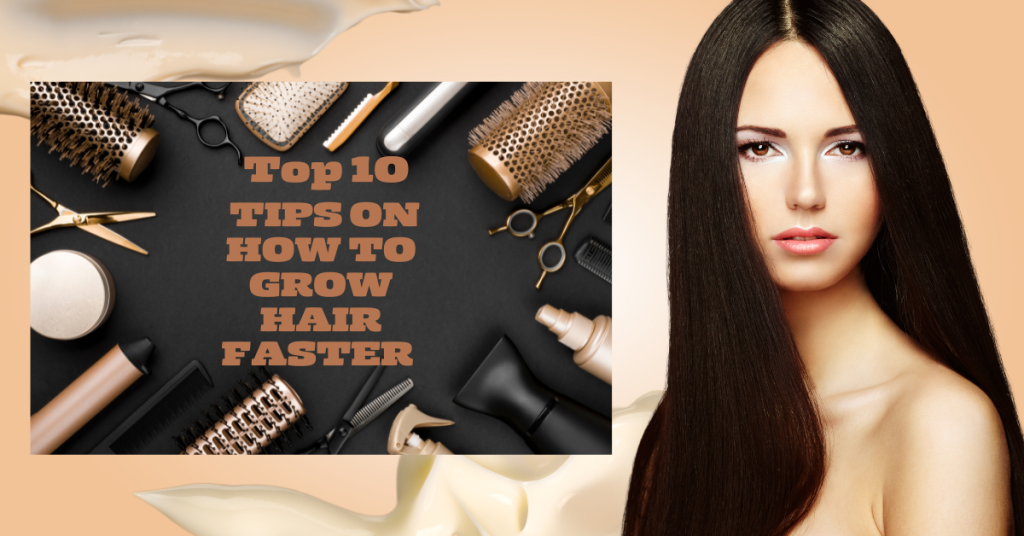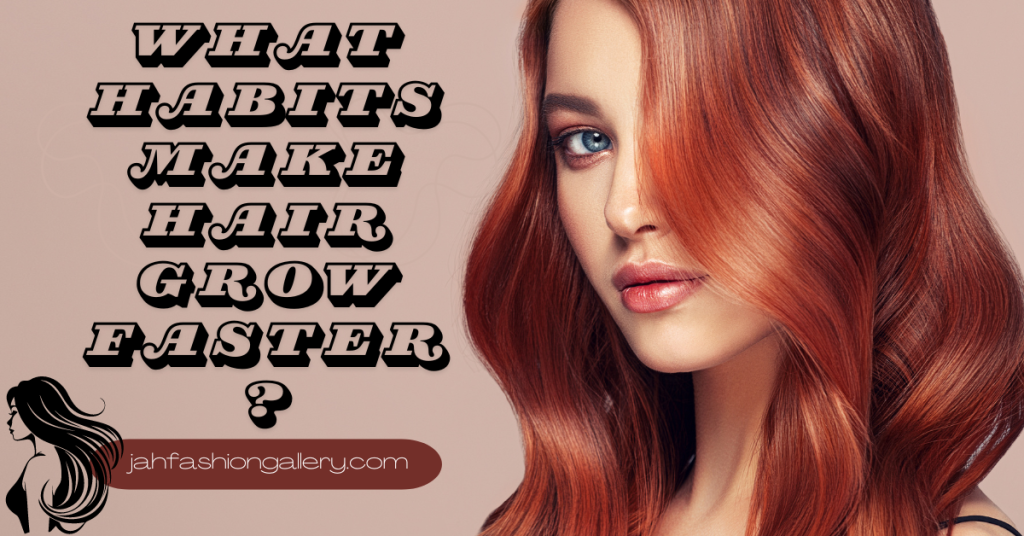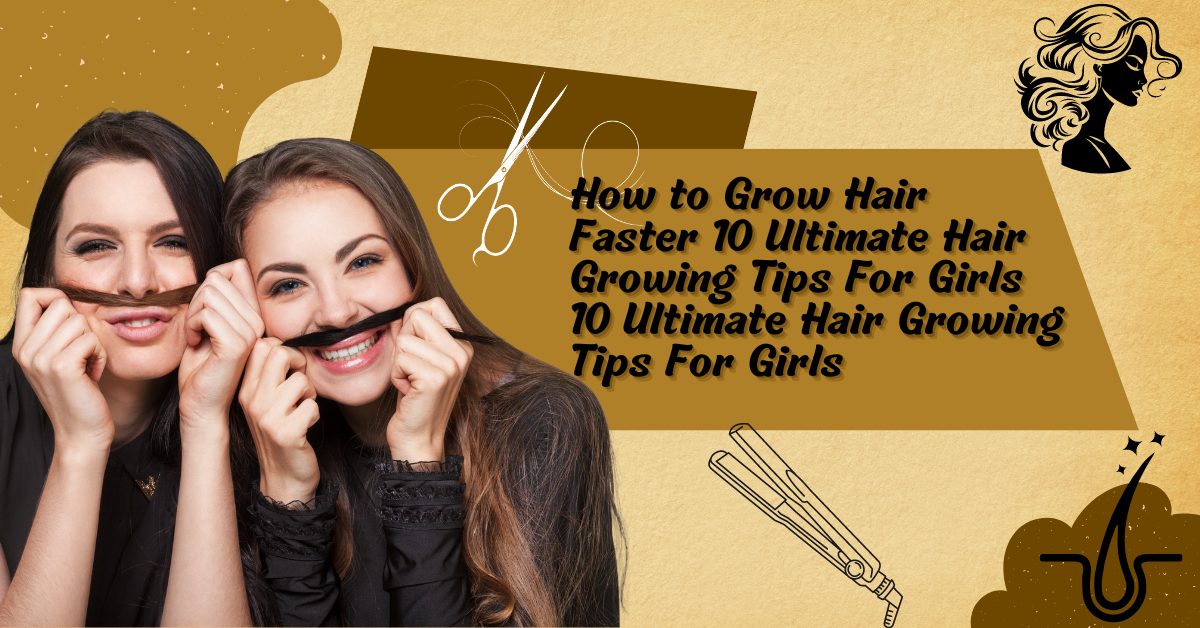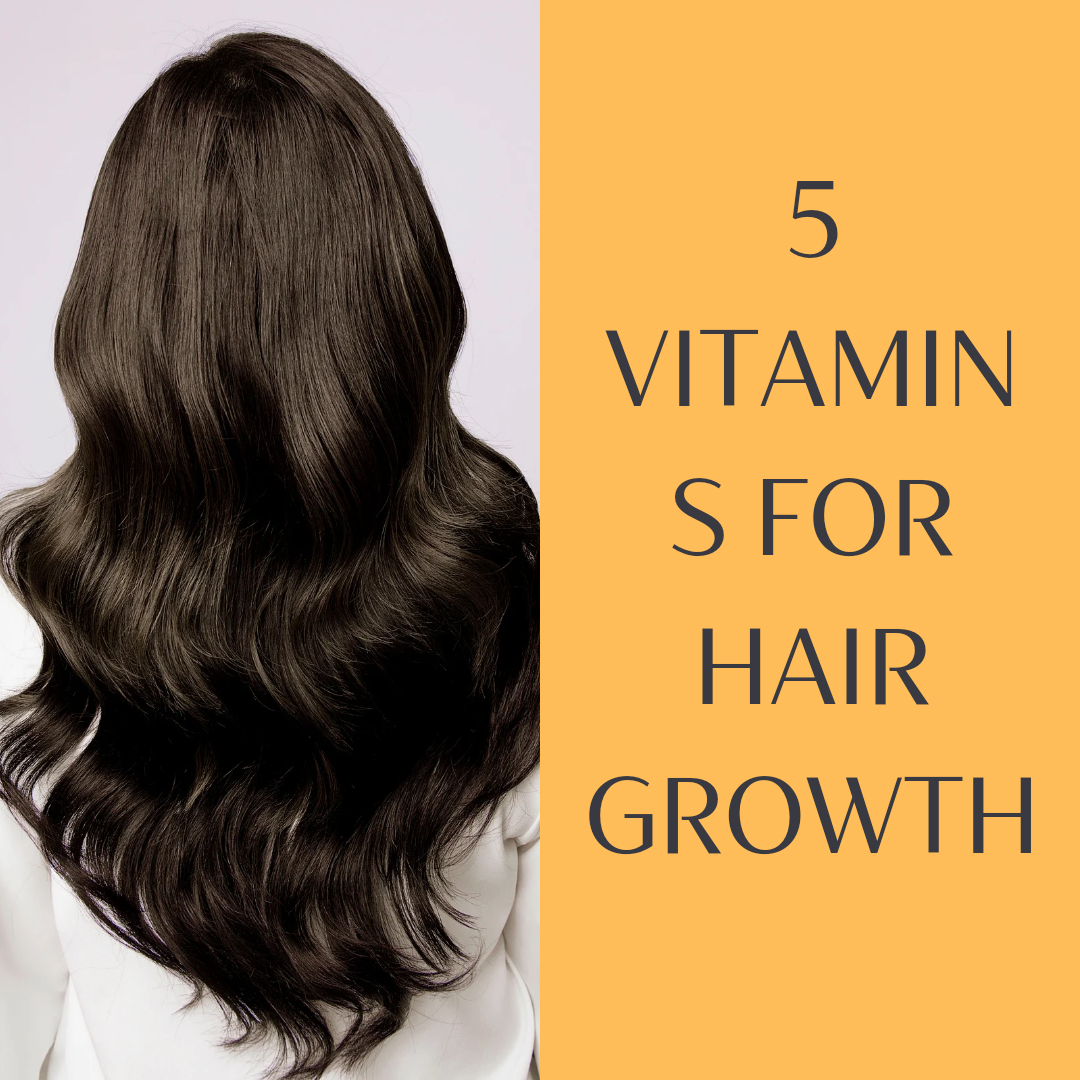Top Tips on How to Grow Hair Faster and Healthier”
Everyone dreams of having long, healthy hair, but it can be hard to know where to start.”
How to Grow Hair Faster 10 Ultimate Hair Growing Tips For Girls Wondering how to grow hair faster? These 10 ultimate hair-growing tips for girls will help you achieve longer, healthier hair in no time. Long, luscious hair has long been a symbol of beauty and vitality, cherished by women around the world. For many girls, achieving and maintaining healthy hair growth is a significant goal. However, achieving long hair isn’t always easy. It requires dedication, patience, and understanding of the factors that influence hair growth. So lets go Learn How to Grow Hair Faster 10 Ultimate Hair Growing Tips For Girls.
Best Hair Care Practices for Faster Growth”
Importance of Hair Growth and Common Challenges Faced by Girls
Hair growth isn’t just about length; it’s a reflection of overall health and wellness. Factors such as genetics, nutrition, and lifestyle choices play crucial roles in determining the speed and quality of hair growth. Additionally, girls often face common challenges like hair breakage, split ends, and environmental damage, which can hinder their efforts to grow long, healthy hair.
In this article, we will explore ten ultimate hair growing tips tailored specifically for girls, offering practical advice and insights to help you achieve your goal of faster, healthier hair growth. Whether you’re dealing with slow growth or seeking to improve the condition of your hair, these tips will guide you on your journey to beautiful, vibrant hair.
1. Proper Nutrition for Hair Growth
Achieving faster hair growth starts from within, with a balanced diet that provides essential vitamins and minerals. The nutrients you consume play a vital role in nourishing your hair follicles and promoting healthy growth. Here’s why a balanced diet is crucial for achieving your hair growth goals:
Value of a Well-rounded Diet High in Nutrients
Your hair is a reflection of your overall health, and adequate nutrition is key to maintaining its strength and vitality. A diet that lacks essential nutrients can lead to hair thinning, dullness, and slow growth. By ensuring you consume a variety of vitamins and minerals, you can support the natural growth cycle of your hair and enhance its appearance.
Specific Foods that Promote Hair Growth
Certain foods are particularly beneficial for promoting hair growth due to their nutrient content:
Eggs: Rich in biotin and protein, essential for hair structure and growth.
Nuts: Provide healthy fats, vitamins (like vitamin E), and minerals (like zinc) that support scalp health and hair growth.
Spinach: Packed with iron, folate, and vitamins A and C, which are essential for hair follicle health and growth.
Incorporating these foods into your diet can provide your hair with the nutrients it needs to grow stronger and faster. Alongside a balanced diet, consider supplements like biotin or multivitamins if you have specific deficiencies that may affect hair growth.
2. Scalp Care Techniques
A well-nourished scalp is essential for robust and lively hair development. By implementing correct scalp care methods, you can establish the perfect setting for your hair follicles to flourish.Here’s why scalp care is crucial for promoting hair growth and some effective tips to incorporate into your routine:
Significance of a Healthy Scalp for Hair Development
Your scalp is where your hair follicles reside, and its health directly impacts the quality and speed of hair growth. A clean and nourished scalp encourages better blood circulation, which delivers essential nutrients to the hair roots. It also helps maintain the natural oils that protect and moisturize your hair.
Tips for Scalp Massages and Using Essential Oils
Scalp Massages: Regular scalp massages can stimulate blood flow to the hair follicles, promoting faster hair growth. Use your fingertips to gently massage your scalp in circular motions for a few minutes daily or during shampooing.
Essential Oils: Incorporating essential oils like peppermint or rosemary can enhance scalp health and promote hair growth. These oils have natural properties that stimulate circulation, reduce inflammation, and nourish the scalp. Mix a few drops of essential oil with a carrier oil (such as coconut or jojoba oil) and massage into your scalp before washing your hair.
By practicing scalp care techniques regularly, you can improve the overall health of your scalp and support faster, healthier hair growth. Consistency is key, so incorporate these tips into your hair care routine to achieve optimal results.
3. Regular Trimming
Many believe that avoiding haircuts will help hair grow longer faster, but in reality, regular trims are essential for maintaining healthy hair growth. Here’s why regular trimming is crucial and how it prevents common hair issues:
Debunking Myths about Trimming and Hair Growth
Contrary to popular belief, getting regular trims does not stunt hair growth. In fact, it helps maintain the overall health of your hair by preventing split ends and breakage. When split ends aren’t trimmed, they can travel up the hair shaft, causing more damage and making your hair appear thinner and less healthy.
How Regular Trims Can Prevent Split Ends and Breakage
By scheduling trims every 8-12 weeks, you can remove split ends before they worsen. This promotes healthier hair growth from the roots and reduces the need for more significant cuts later on. Regular trims also help maintain your hair’s shape and style, ensuring it looks its best as it grows longer.

4. Choosing the Right Hair Products
Using the right hair products is essential for maintaining healthy hair and promoting growth. Here’s why selecting sulfate-free shampoos and conditioners matters and how to choose products tailored to your hair type:
Importance of Using Sulfate-Free Shampoos and Conditioners
Sulfates are tough cleaning agents present in numerous store-bought shampoos that can remove the hair’s natural oils, causing it to become dry and damaged. Products without sulfates are kinder to the hair and scalp, keeping the natural oils intact and avoiding too much drying.
How to Select Products Based on Hair Type and Concerns
Identify Your Hair Type: Determine whether your hair is oily, dry, curly, straight, etc. This will guide you in choosing products that cater to specific needs.
Consider Your Concerns: Whether you have dandruff, color-treated hair, or scalp sensitivity, select products that address these concerns. Look for ingredients like argan oil for hydration or tea tree oil for scalp health.
Read Labels Carefully: Avoid products containing sulfates, parabens, and alcohol, as these can be drying and damaging to hair over time. Opt for natural or organic ingredients whenever possible.
Choosing the right hair products tailored to your hair type and concerns ensures that your hair remains healthy, vibrant, and conducive to faster growth. Try out various items until you discover the ones that suit you the most.
5. Avoiding Heat Damage
Heat styling tools like flat irons and curling wands can significantly damage hair over time if not used properly. Here’s why reducing heat styling and using heat protectants are important, along with alternative styling methods:
Tips for Reducing Heat Styling and Using Heat Protectants
Limit Heat Exposure: Minimize the use of hot tools to no more than once or twice a week.Choose to let your hair air dry or use the lowest heat settings available whenever you can.
Use Heat Protectants: Apply a heat protectant spray or serum before using any heat styling tools. This creates a barrier between your hair and the heat, reducing damage and breakage.
Alternative Styling Methods that Promote Hair Health
Air-Drying: Allow your hair to air-dry naturally whenever you can to reduce exposure to heat.
Heatless Styling: Experiment with heatless styling methods such as braiding, twists, or overnight curls using fabric or foam rollers.
By minimizing heat exposure and using protective products, you can help maintain the health and strength of your hair while promoting faster growth.
6. Proper Hair Washing Techniques
The way you wash your hair can impact its growth and overall health. Here’s how to determine the optimal washing frequency and tips for gentle washing and rinsing techniques:
The Frequency of Hair Washing for Best Development
Frequency: Wash your hair 2-3 times per week, depending on your hair type and lifestyle. Using too much soap can remove the natural oils from your hair, whereas not using enough soap can cause accumulation and problems with your scalp.
Tips for Gentle Washing and Rinsing Techniques
Use Lukewarm Water: Avoid hot water, as it can dry out your scalp and hair. Choose warm water to softly wash your hair and scalp.
Massage Gently: Use your fingertips to massage shampoo into your scalp in circular motions to stimulate blood flow and remove dirt and buildup.
Condition Properly: Apply conditioner from mid-length to ends, avoiding the scalp, to moisturize and detangle hair without weighing it down.
Proper hair washing techniques ensure your scalp remains healthy and your hair grows optimally. Incorporate these tips into your routine to maintain clean, healthy hair conducive to faster growth.

7. Lifestyle Changes for Hair Growth
Adopting healthy habits can greatly affect the condition and development of your hair. Here’s how managing stress, improving sleep patterns, and adopting healthy habits can support hair growth:
The Effect of Stress and Rest on the Condition of Hair
Stress: Chronic stress can disrupt the hair growth cycle, leading to hair thinning and shedding. Practice stress-reducing techniques such as yoga, meditation, or deep breathing exercises to promote relaxation and reduce hair-related issues.
Rest: Getting good rest is crucial for your general well-being, which also plays a role in the growth of your hair. Aim for 7-9 hours of sleep per night to allow your body and hair follicles to regenerate and repair. Establish a bedtime routine and create a comfortable sleep environment to improve sleep quality.
Tips for Managing Stress and Improving Sleep Patterns
Maintain a Consistent Exercise Schedule:Engaging in physical exercise can lower stress and enhance the quality of your sleep. Add exercises such as running, swimming, or practicing yoga to your daily schedule.
Practice Mindfulness: Engage in activities that promote relaxation and mindfulness, such as journaling, listening to calming music, or spending time in nature.
8. Hydration and Hair Growth
Proper hydration is crucial for maintaining healthy hair growth and overall hair health. Here’s why drinking enough water is important and how dehydration can affect hair growth and appearance:
Importance of Drinking Enough Water for Overall Hair Health
Hydration:Water makes up a significant portion of your hair’s composition. Drinking an adequate amount of water ensures your scalp and hair follicles remain hydrated, promoting hair elasticity and strength.
How Dehydration Can Affect Hair Growth and Appearance
Dryness: Lack of water can result in hair that becomes dry and fragile, making it more likely to break and develop split ends.
Scalp Health: A well-hydrated scalp supports healthy hair growth by maintaining the natural oils that nourish and protect your hair follicles.
Tips for Ensuring Proper Hydration
Drink Plenty of Water: Aim to drink at least 8 glasses (about 2 liters) of water per day, adjusting based on your activity level and climate.
Hydrate Your Scalp: Use hydrating hair masks or scalp treatments containing ingredients like aloe vera or coconut oil to moisturize and nourish your scalp.
By adopting these lifestyle changes and maintaining proper hydration, you can support healthy hair growth and enhance the overall appearance and strength of your hair.
9. Supplements for Hair Growth
Supplements can play a supportive role in promoting hair growth by providing essential nutrients that may be lacking in your diet. Here’s an overview of popular supplements like biotin and collagen, along with considerations and potential benefits:
Overview of Supplements like Biotin and Collagen
Biotin: Biotin, also known as vitamin B7, is a water-soluble vitamin that supports the health of your hair, skin, and nails. It helps strengthen hair strands and may reduce hair thinning.
Collagen: Collagen: Collagen is a form of protein responsible for maintaining the structure of your hair.Supplementing with collagen peptides can help improve hair elasticity, strength, and overall quality.
Considerations and Potential Benefits of Using Supplements
Addressing Deficiencies: Supplements can be beneficial if you have specific nutrient deficiencies that impact hair health, such as biotin or iron deficiency.
Consultation with a Healthcare Professional: Before starting any supplement regimen, it’s advisable to consult with a healthcare provider, especially if you have underlying health conditions or are taking medications.
10. Patience and Consistency
Achieving faster hair growth requires understanding and embracing the natural hair growth cycle. Here’s why patience and consistency are key to maintaining healthy hair practices:
Emphasize the Natural Hair Growth Cycle
Anagen Phase: This stage is when hair follicles are actively growing. Hair grows approximately half an inch per month, but this rate can vary depending on genetics and overall health.
Catagen and Telogen Phases: These are transitional and resting phases where hair stops growing and eventually sheds to make way for new growth.
Encouragement to Stay Consistent with Healthy Hair Practices
Establish a Routine: Develop a consistent hair care routine that includes proper nutrition, scalp care, gentle washing techniques, and minimal heat styling.
Monitor Progress: Keep track of your hair growth journey to celebrate small milestones and stay motivated.
Manage Expectations: Understand that achieving longer hair takes time and patience. Consistently following healthy hair practices will yield gradual but sustainable results.
By understanding the natural hair growth cycle and committing to consistent care, you can optimize conditions for healthier, faster-growing hair over time.
Conclusion: Incorporating these 10 tips into your hair care routine can significantly enhance hair growth and health. By maintaining a healthy diet, staying hydrated, caring for your scalp, and adopting healthy hair practices, you can achieve the luscious locks you desire. Share your hair growth journey or any additional tips in the comments below – we’d love to hear from you!
Remember, beautiful hair starts with healthy habits and self-care. Accept your inherent attractiveness and honor the distinctiveness of your hair. Whether your goal is to add length, improve texture, or enhance shine, prioritizing your hair’s health will yield lasting results.
Now is the time to take action towards achieving healthier, longer hair. Start implementing these tips into your daily routine and observe the positive changes in your hair’s appearance and strength. Share about your journey to thicker hair in the comments section—we’re eager to learn from your advice and stories!




